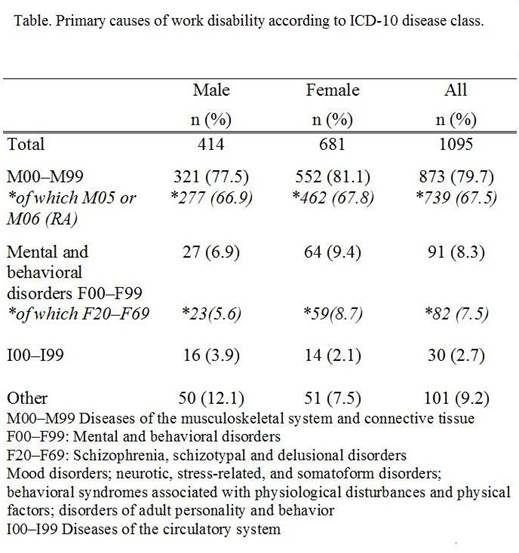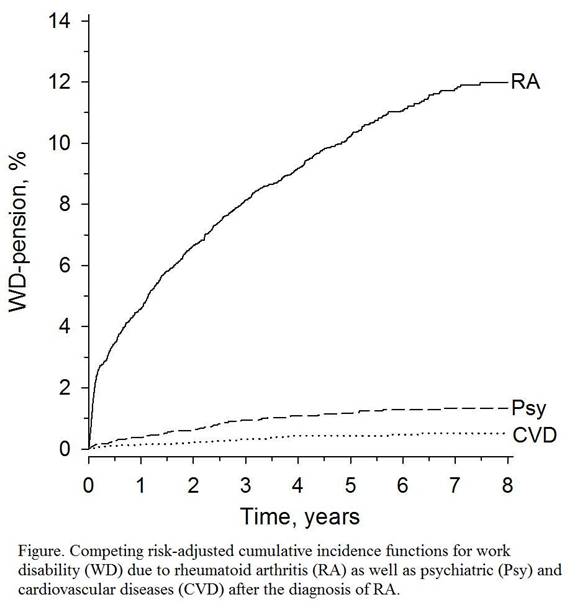Session Information
Session Type: Abstract Submissions (ACR)
Background/Purpose: A remarkable proportion of rheumatoid arthritis (RA) patients stop working before the normal age of retirement. Initial research data suggests that comorbidities, with depression in particular, may increase work disability (WD) rates in RA. The aim of this study was to determine the contribution of psychiatric and cardiovascular (CV) comorbidities to WD among RA patients.
Methods: All incident, non-retired patients with RA (aged 18–64 years, RA diagnosed in 2000–2007) were identified from a Finnish nationwide register maintained by the Social Insurance Institution. From another register maintained by the Finnish Centre for Pensions, data on WD in the RA cohort as well as the entire Finnish population was obtained up until December 31, 2008. The data included all permanent disability pensions and WD periods which had continued for at least one year at the end of the follow-up. The incidence of WD caused primarily by CV diseases, psychiatric disease, and RA was analyzed. The primary cause of WD was identified by the ICD-10 codes I00–99 for CV diseases, F20–69 for psychiatric diseases, and M05 or M06 for RA as the first (i.e. the most important) diagnosis in the register.
Results: We identified a cohort of 7,831 patients with RA who were available for work full-time (71% women, mean age 46 [SD 11]). During the follow-up (median 4.0 years, IQR 2.2–6.3), 1,095 (14.0%) patients became disabled for work. In two out of three cases, the primary cause was RA, whereas psychiatric diseases constituted the second-most important cause (Table). After adjusting for competing risks, 12.0% (95% CI 11.5 to 12.4), 1.3% (1.2 to 1.5), and 0.5% (0.4 to 0.6) of the RA patients lost their capacity for work primarily due to RA, a psychiatric comorbidity, or a CV disease, respectively (Figure). A CV cause was more frequent among men, but no difference was found between the sexes in psychiatric causes. Compared with the overall Finnish population, the age- and sex-specific standardized incidence ratios of WD due to CV or psychiatric comorbidities were 1.75 (95% CI 1.23 to 2.51) and 0.99 (95% CI 0.80 to 1.23), respectively.
Conclusion: In this cohort of RA patients from 2000–2007, psychiatric or CV comorbidities were the primary causes of WD much less frequently than RA itself. This may, however, represent only a part of their overall contribution to WD, as they may enhance the devastating impact of RA on working capacity without being the leading cause of WD. The risk of WD due to CV disease is higher in RA than in the general population, but psychiatric comorbidities do not appear to cause WD beyond the population level in early RA.
Disclosure:
A. M. Kerola,
None;
T. Nieminen,
None;
M. J. Kauppi,
None;
H. Kautiainen,
None;
T. Kerola,
None;
L. J. Virta,
None;
T. Pohjolainen,
None;
K. Puolakka,
None.
« Back to 2013 ACR/ARHP Annual Meeting
ACR Meeting Abstracts - https://acrabstracts.org/abstract/psychiatric-and-cardiovascular-comorbidities-as-causes-of-work-disability-among-individuals-with-rheumatoid-arthritis/


